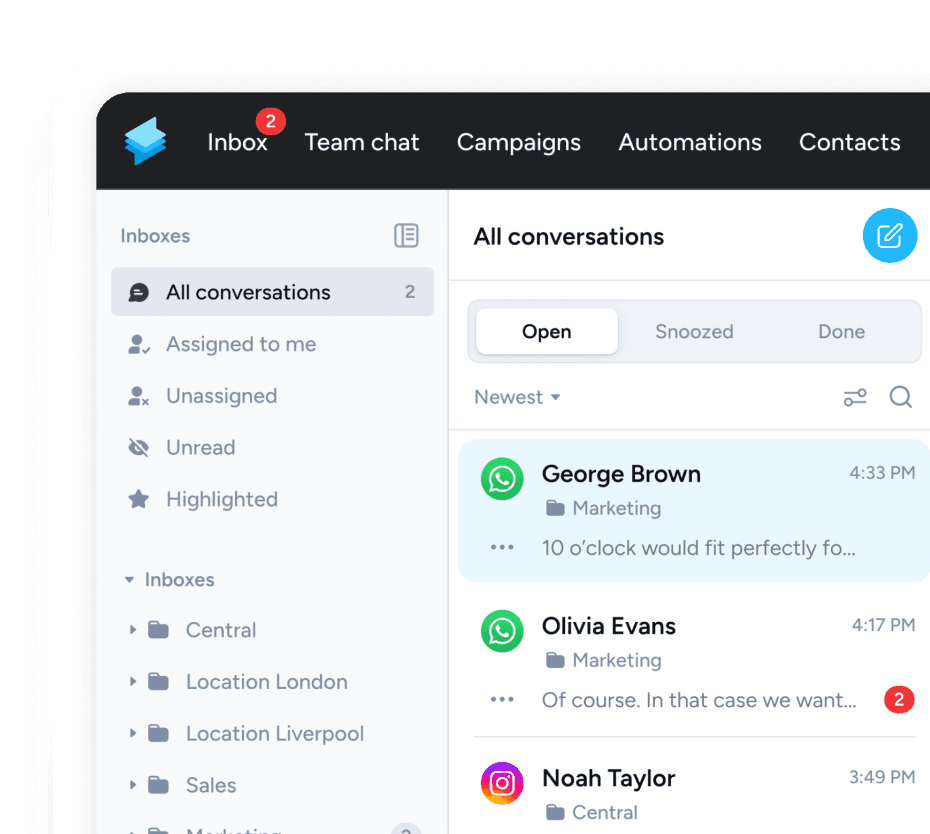With over 2 billion monthly active users, WhatsApp is one of the most popular messaging apps in the world. The app has become an indispensable communication channel for many people. Businesses are quickly catching up and increasingly turning to WhatsApp Business for customer service.
Messengers are a convenient and fast way to contact businesses. 38% of all customers expect to be able to reach businesses via their preferred communication channel. 60% of customers expect a response to support queries within 10 minutes(1). Fast and convenient service has become a necessity.
So outdated contact forms, long queues and tedious email processes are a thing of the past.
WhatsApp & Co. are available to customers anytime, anywhere. Used correctly, they can help improve your service while freeing up staff and significantly increasing customer satisfaction. Messengers like WhatsApp are designed for fast and informal communication and can now be integrated with many other tools to automate processes.
Learn more about,
- The importance of WhatsApp as a customer service channel
- The benefits of using messengers in customer service
- Best practices for using WhatsApp and other messengers in customer service.
Customer service evolves: from contact forms to WhatsApp Business
Customer satisfaction should be one of the most important issues for every company. Satisfied and returning customers are the lifeblood of a successful company. At the same time, 37% of all customers refrain from buying from a company again if they were dissatisfied with the service. 32% are even prepared to leave a bad review(2).
But customer service is not always easy. Sometimes support can even be a real challenge. This is because reconciling the requirements of efficient processes behind the scenes with high-quality customer care is no easy endeavour.
Both internally and externally, processes should be as simple as possible. Hidden contact forms are just as outdated as long queues on the phone.
Why? Because they demand too much information and too much time from customers. The process takes too long and an answer usually takes a while. Customer satisfaction is negatively impacted before they have even received a response.
Customer satisfaction is a top priority for most organisations. Satisfied and loyal customers are the lifeblood of any successful business. 37% of customers will not buy from a company again if they are dissatisfied with the service. 32% are even prepared to leave a bad review(2).
But customer service is not all fun and games. In fact, it is hard work. Balancing the need for efficient, streamlined internal processes with high-quality customer service is no easy task.
Both internal and external processes need to be as efficient as possible. Hidden contact forms are as outdated as long phone queues.
Why is that? Because they ask customers to provide too much information at once and take too much time. The process takes too long, and responses often take even longer. Customer satisfaction is negatively affected before they even receive service.
WhatsApp as a customer service channel is a convenient and fast way for customers to get in touch with businesses. Today's customers expect to be able to reach a company 24/7 through a variety of channels. In addition to email, this includes messengers such as WhatsApp and social networks.
The following chart from the Superchat Messaging Report 2023 shows the importance of digital channels for customer contact:
At over 64%, WhatsApp is the most important channel for Superchat users to receive customer enquiries, followed by email and Instagram. Direct messaging on the social network accounts for 12.6% of all enquiries.
In Germany alone, WhatsApp is used by more than 80% of all internet users. In many parts of the world, messengers play an even bigger role in everyday life. Almost every user sends and receives text messages on a daily basis. So it's no surprise that Meta is expanding its commercial opportunities with the WhatsApp Business app and API.
**In short, customers want easy customer service channels like WhatsApp. Businesses have a secure solution with the WhatsApp API.
The benefits of using WhatsApp for customer service
Customers want to chat with businesses. 66% of users prefer to contact businesses via chat or messenger first(3). If that's not reason enough to choose WhatsApp for customer service, there are even more benefits.
Customer service via messenger is convenient
WhatsApp is always available to customers and is already part of their everyday lives. Instead of filling out complicated contact forms or searching for a phone number, a message is sent over WhatsApp. And unlike traditional live chat on websites, customers are not tied to a device or risk losing their history.
WhatsApp also makes it easier for customer service agents to communicate. With just a few clicks, customers can be notified of updates, information about a query, etc. via Messenger. WhatsApp can also be easily integrated with other tools, for example to automatically create support tickets or create AI chatbots in Messenger.
Customer service via WhatsApp can be hyper-personal
WhatsApp is used to exchange messages with friends and family. WhatsApp allows businesses to have one-to-one conversations with their customers. This is an ideal basis for building long-term and loyal customer relationships, as most customers expect companies to tailor their services, including support, to them.
With Messenger, communication takes place at eye level and barriers are broken down. Even automated messages are personalised with text modules, emoticons and media.
Customer support via messengers is super-fast
Customers expect a quick response to their queries - especially when there is a problem. WhatsApp offers a simple solution for both consumers and businesses. Instead of waiting on hold, customers send a message from their smartphone. Customer service, in turn, prioritises and responds to incoming messages.
Unlike live chat, WhatsApp takes the pressure off customer service. Messages are responded to quickly, but not in real time. Important queries are dealt with immediately, while less complex messages are dealt with later.
At the same time, automation and chatbots can be used to handle simple and frequent queries.
Customer service via WhatsApp and more is easily implemented
Implementing WhatsApp for customer service is not expensive and does not require any special hardware or software. The safest option for using WhatsApp in a GDPR-compliant and efficient way for customer service is the WhatsApp Business API.
With the API, WhatsApp offers a comprehensive solution for businesses. Features such as employee assignment, notes, labels, etc. provide employees with the tools they need to provide excellent customer service.


Best Practices - Tips & Tricks for Customer Service via WhatsApp & Co in
Used correctly, WhatsApp as a service channel can improve your availability and reduce the workload for you and your staff, leading to more satisfied customers in the long run. It is important that WhatsApp is integrated into your processes and used efficiently.
Integrate WhatsApp with your other tools
Customer service and support is a challenging and complex task. Businesses are becoming more complex, with an increasing number of channels and tools. At the same time, technological developments mean that customers expect more efficient processes and personalised service.
When customers contact companies with enquiries, they generally expect support staff to have their data available, for example from purchases or previous enquiries, and to resolve their concerns quickly and effectively.
At the same time, enquiries need to be well documented, but internal processes should remain as efficient as possible.
Messengers have many advantages that can help meet these requirements. Stand-alone solutions can help answer enquiries more quickly, but as an additional tool they also add complexity. Messaging suites such as Superchat allow companies to integrate messengers such as WhatsApp with other tools and automate processes.
This frees up support agents to focus on what really matters: happy customers.
Automate recurring processes and enquiries
Depending on the industry and study, knowledge workers spend between 30-60% of their working time searching for and processing information and performing other bureaucratic tasks. (4, 5) This proportion is particularly high in customer-facing roles.
Information should also be available quickly, especially in support. This makes it all the more important to automate recurring tasks and processes and make them as efficient as possible. Standardised processes, such as assigning requests or creating support tickets, can often be fully automated.
With Superchat automations, for example, companies can easily create chatbots and workflows for WhatsApp & Co. to automatically handle recurring tasks and requests. The automations can also be integrated with other systems using tools like Zapier and Make. This means that even complex processes can be automated across the entire organisation.
Start using AI-Chatbots
Chatbots are ideal for automating repetitive processes and recurring enquiries. They allow agents to focus on complex customer queries. Their valuable time is put to better use.
Automation has long been used to create WhatsApp bots with canned responses that automatically answer common customer queries. But with AI tools like ChatGPT, businesses can go one step further and automate responses to new and more complex queries.
However, when using AI in messengers, employees should always have the option to intervene in the conversation. After all, the company is ultimately responsible for the chatbot's answers. In addition, AI models are not yet able to answer all queries.
Especially in support, it is also important that companies use a solution that is tailored to the company. This ensures the quality of the answers and the right tone of voice.


